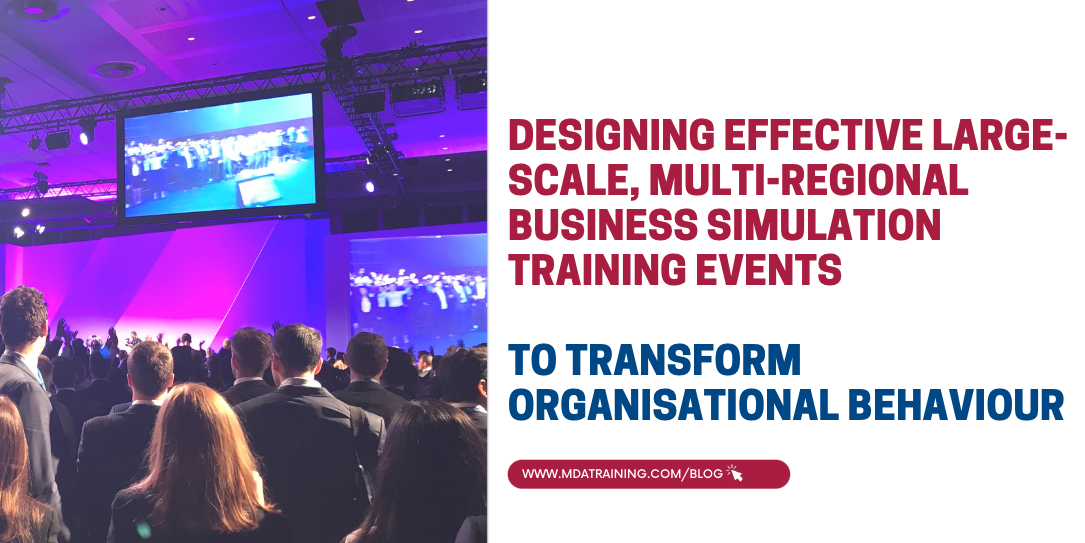Tag: Experiential learning
-

Inclusive Learning Solutions for Underrepresented Groups and Disadvantaged Backgrounds
Promoting equality, diversity, and inclusion (EDI) is essential for creating a robust people management strategy in any organisation. EDI initiatives broaden talent pools by attracting individuals from underrepresented and disadvantaged backgrounds. Greater diversity promotes fresh perspectives, attitudes, and resilience, driving company growth. Attracting talent from underrepresented communities such as Black, Asian, LGBTQ+, and disadvantaged groups…
-

Designing Effective Large-scale, Multi-regional Business Simulation Training Events to Transform Organisational behaviour
In today’s fast-paced, ever-changing business environment, organisations must be able to adapt and evolve to meet new challenges and opportunities. To achieve this, companies need to invest in their people, providing them with the skills, knowledge and behaviours required to succeed. One effective way to achieve this is through large-scale, multi-regional business simulation training events. …
-

Effective Business Simulation Training for Professional Services (Consultancy) Sectors
Professional services, particularly the consultancy sector, play a crucial role in the growth and success of businesses. In order to deliver the best results for clients, it is imperative for consultants to possess a deep understanding of industry dynamics and operating models. This is where business simulation training comes into play, offering a powerful tool…
-

Digital Business Simulations: How to maximise commercial productivity
2024 saw many businesses, from an array of industries, embracing remote working due to the coronavirus pandemic. With more and more employees relying on their screens to carry out their responsibilities, training within the workplace has also seen a dramatic shift to the virtual landscape. Over the course of last year, we saw businesses from…
-

5 Virtual Event Trends for 2024
If 2024 saw the rise of the virtual event, then 2024 will be the year that businesses worldwide truly embrace the versatility that they offer. In the wake of the coronavirus pandemic and the remote working boom – a myriad of online conference platforms made their way to market, putting board meetings, seminars, even workplace…
-

How experiential virtual training is solving the challenges faced by the banking sector
Before the COVID-19 pandemic, the banking industry’s traditional business model was already under significant strain, facing real challenges brought on by the rise of internet & open banking. With consumer demand shifting from the local branches and cashier desks of yesterday to the secure smartphone apps and innovative online products that we expect today –…
-

Meeting the demand for online conference platforms in 2024
Whether through necessity, choice or a combination of the two, companies from all manner of sectors and industries have embraced remote working over the last twelve months. As a result, online conference platforms have exploded onto the scene, revolutionising the way businesses interact with customers and colleagues alike. So what are online conferences? Online conferences…
-

The top 5 skills for your 2024 training
In a year dominated by a pandemic (and the difficult decisions that had to be made by employers), it’s understandable if you’re looking forward to the New Year, and the opportunities it may bring. With the Pfizer/BioNTech COVID-19 vaccine receiving regulatory approval for use in the UK at the beginning of December (Canada and the…
-

Assessing operational risks in banks throughout 2024 and beyond
Risk management in banking has never been more complex than it is today. The past decade brought with it a global financial crisis, banking scandals, technological advancements, and much more. All of this has contributed to tightened regulations and increased compliance on a worldwide scale. The operational risks that banks have to juggle are as…
-

What are business simulations?
Business simulations are a practical, engaging workplace learning method, consisting of a range of activities related to specific goals and KPIs. Instead of traditional classroom-based learning, simulations imitate reality and stimulate collaborative working among employees, thus improving learning retention and boosting morale. How are simulations beneficial for businesses? There are several benefits that business simulations…